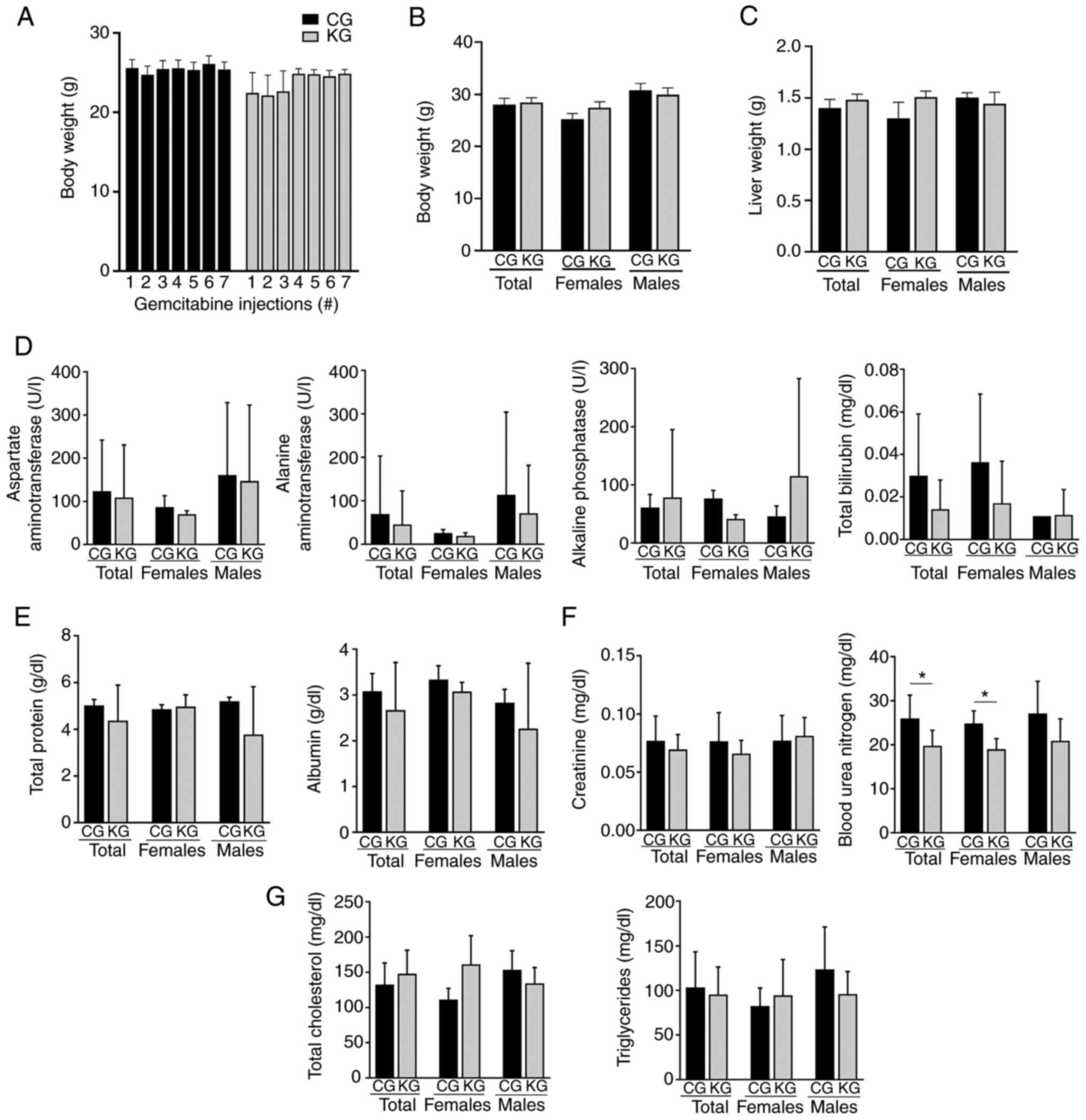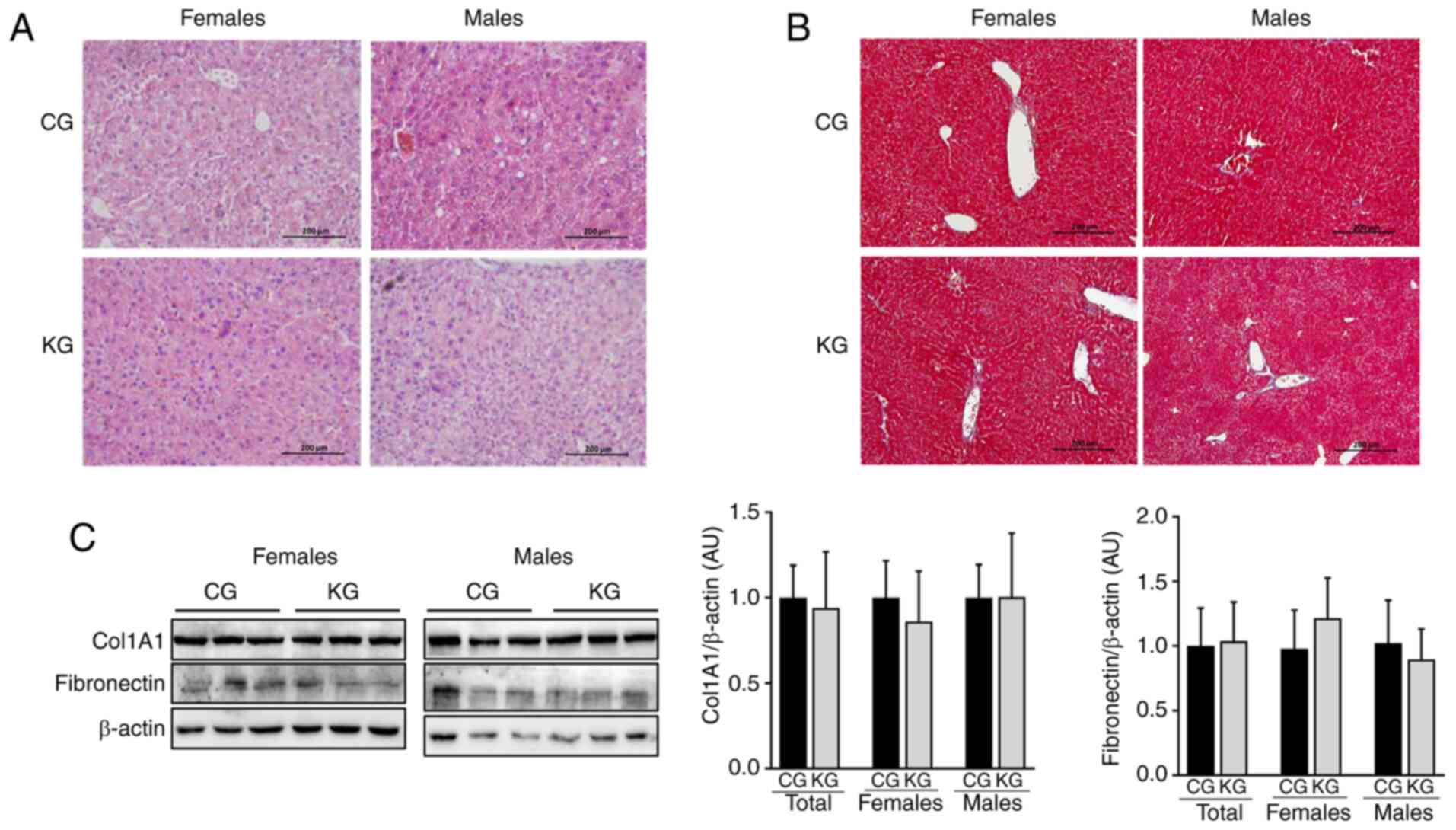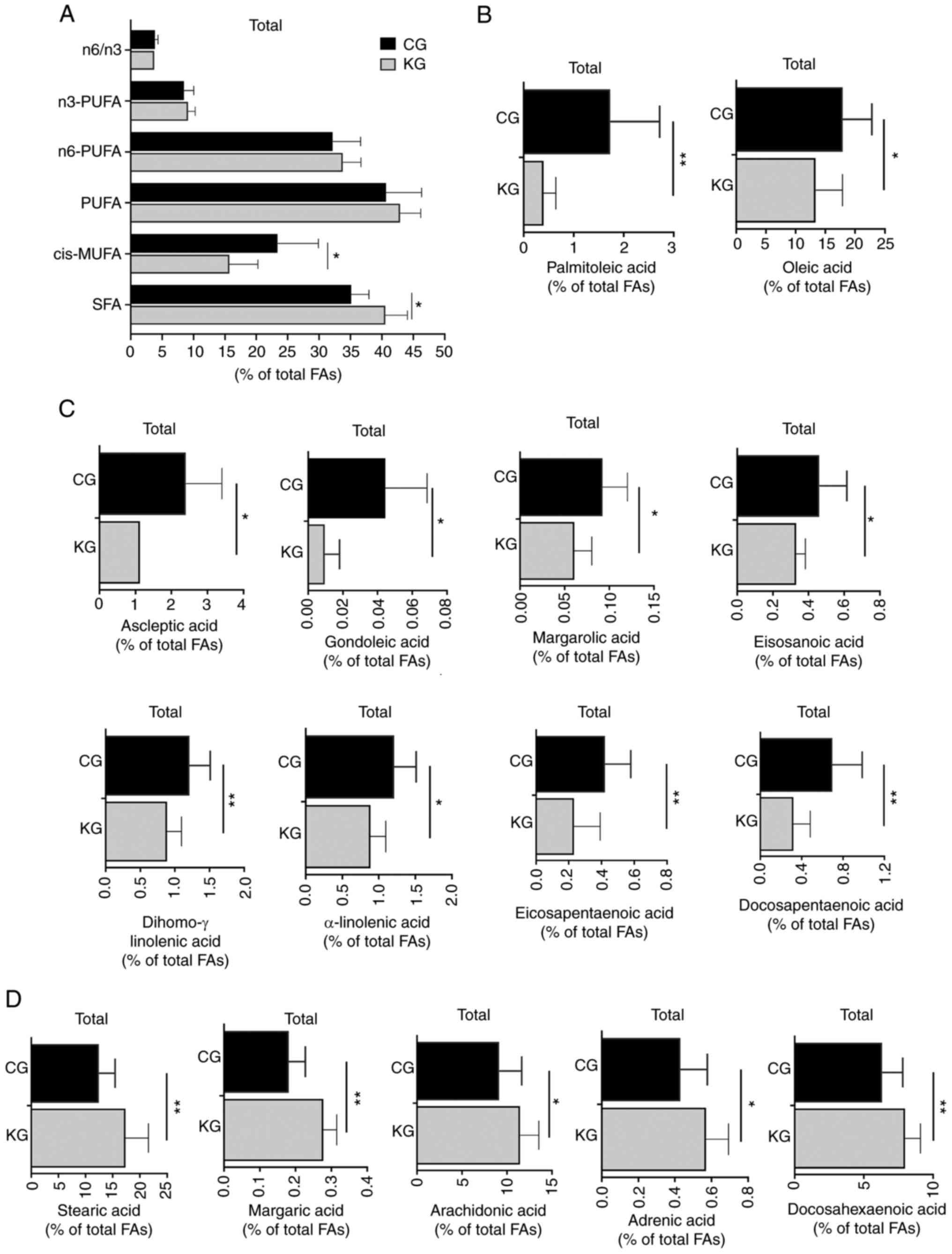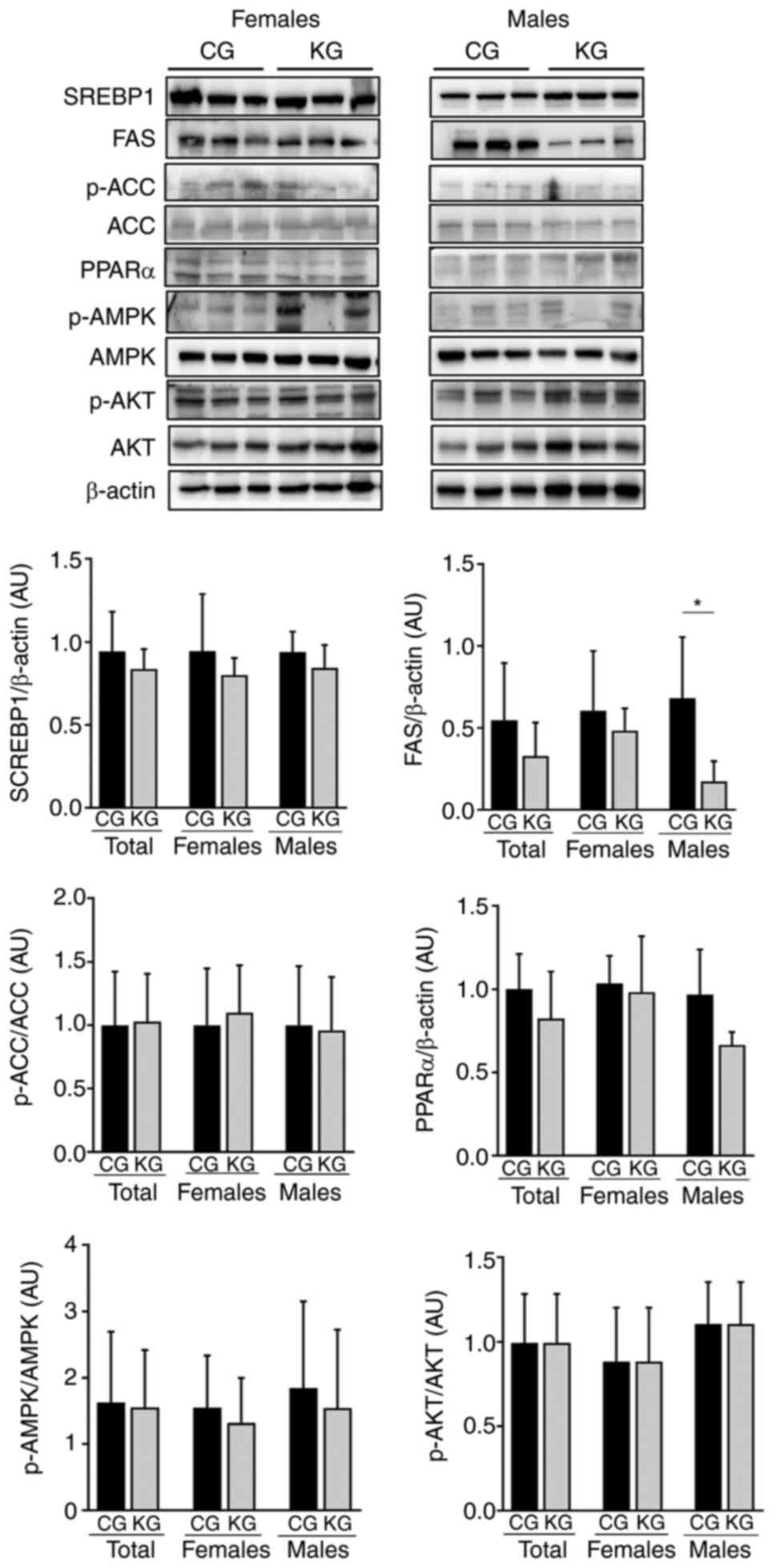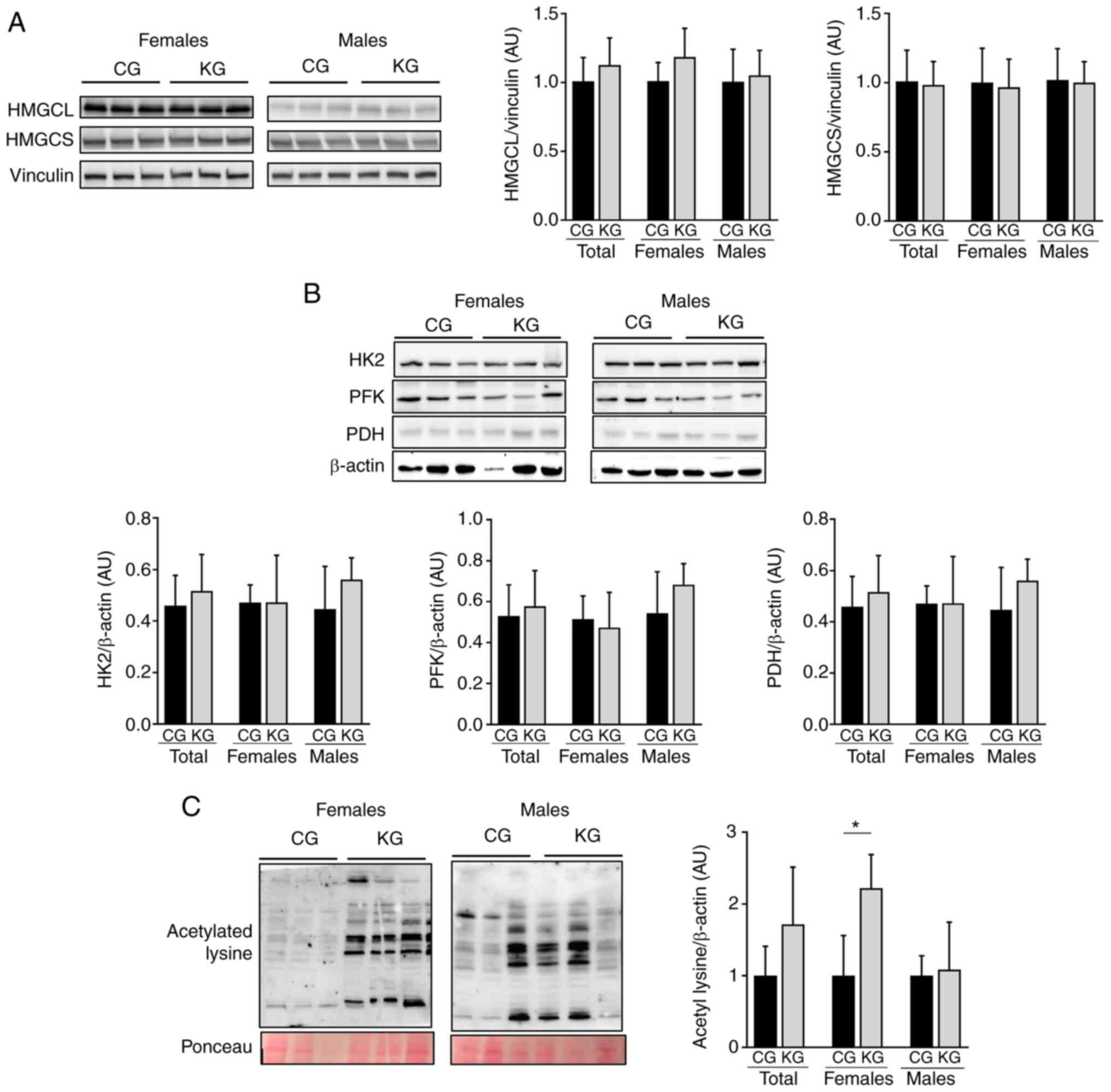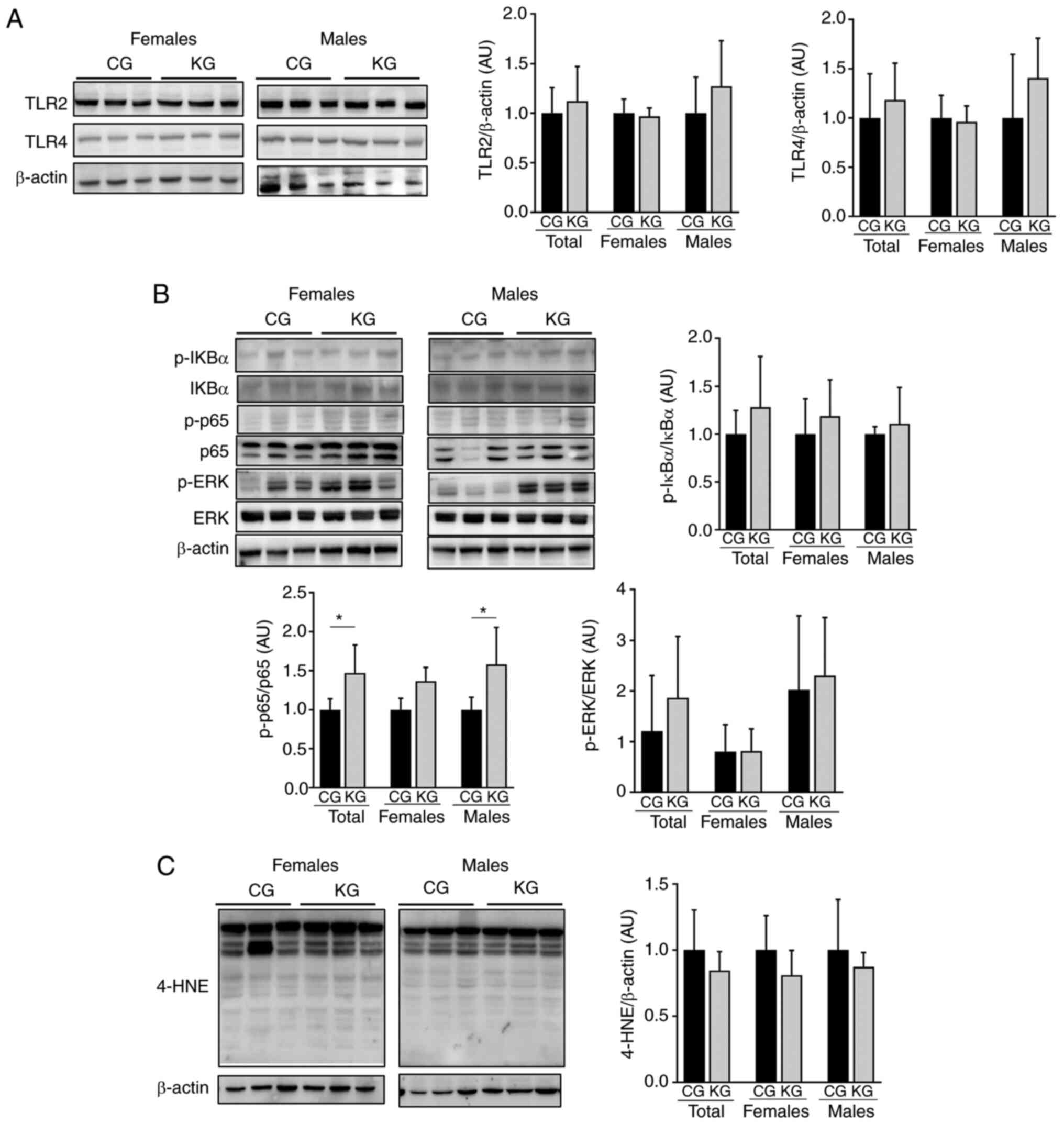|
1
|
Zhu H, Bi D, Zhang Y, Kong C, Du J, Wu X,
Wei Q and Qin H: Ketogenic diet for human diseases: The underlying
mechanisms and potential for clinical implementations. Signal
Transduct Target Ther. 7:112022. View Article : Google Scholar : PubMed/NCBI
|
|
2
|
Tong X, Deng Y, Liu L, Tang X, Yu T, Gan
J, Cai Q, Luo R and Xiao N: Clinical implementation of ketogenic
diet in children with drug-resistant epilepsy: Advantages,
disadvantages, and difficulties. Seizure. 99:75–81. 2022.
View Article : Google Scholar : PubMed/NCBI
|
|
3
|
Thomas JG and Veznedaroglu E: Ketogenic
diet for malignant gliomas: A review. Curr Nutr Rep. 9:258–263.
2020. View Article : Google Scholar : PubMed/NCBI
|
|
4
|
Cortez NE and Mackenzie GG: Ketogenic
diets in pancreatic cancer and associated cachexia: Cellular
mechanisms and clinical perspectives. Nutrients. 13:32022021.
View Article : Google Scholar : PubMed/NCBI
|
|
5
|
Zhang WH, Wang WQ, Han X, Gao HL, Li TJ,
Xu SS, Li S, Xu HX, Li H, Ye LY, et al: Advances on diagnostic
biomarkers of pancreatic ductal adenocarcinoma: A systems biology
perspective. Comput Struct Biotechnol J. 18:3606–3614. 2020.
View Article : Google Scholar : PubMed/NCBI
|
|
6
|
Li J, Zhang H and Dai Z: Cancer treatment
with the ketogenic diet: A systematic review and meta-analysis of
animal studies. Front Nutr. 8:5944082021. View Article : Google Scholar : PubMed/NCBI
|
|
7
|
Kennedy AR, Pissios P, Otu H, Roberson R,
Xue B, Asakura K, Furukawa N, Marino FE, Liu FF, Kahn BB, et al: A
high-fat, ketogenic diet induces a unique metabolic state in mice.
Am J Physiol Endocrinol Metab. 292:E1724–E1739. 2007. View Article : Google Scholar : PubMed/NCBI
|
|
8
|
Bertholdt L, Gudiksen A, Jessen H and
Pilegaard H: Impact of skeletal muscle IL-6 on regulation of liver
and adipose tissue metabolism during fasting. Pflugers Arch.
470:1597–1613. 2018. View Article : Google Scholar : PubMed/NCBI
|
|
9
|
Cunha GM, Guzman G, Correa De Mello LL,
Trein B, Spina L, Bussade I, Marques Prata J, Sajoux I and
Countinho W: Efficacy of a 2-month very low-calorie ketogenic diet
(VLCKD) compared to a standard low-calorie diet in reducing
visceral and liver fat accumulation in patients with obesity. Front
Endocrinol (Lausanne). 11:6072020. View Article : Google Scholar : PubMed/NCBI
|
|
10
|
Watanabe M, Tozzi R, Risi R, Tuccinardi D,
Mariani S, Basciani S, Spera G, Lubrano C and Gnessi L: Beneficial
effects of the ketogenic diet on nonalcoholic fatty liver disease:
A comprehensive review of the literature. Obes Rev. 21:e130242020.
View Article : Google Scholar : PubMed/NCBI
|
|
11
|
Cortez NE, Pathak S, Rodriguez Lanzi C,
Hong BV, Crone R, Sule R, Wang F, Chen S, Gomes AV, Baar K and
Mackenzie GG: A ketogenic diet in combination with gemcitabine
mitigates pancreatic cancer-associated cachexia in male and female
KPC mice. Int J Mol Sci. 24:107532023. View Article : Google Scholar : PubMed/NCBI
|
|
12
|
Cortez NE, Rodriguez Lanzi C, Hong BV, Xu
J, Wang F, Chen S, Ramsey JJ, Pontifex MG, Müller M, Vauzour D, et
al: A ketogenic diet in combination with gemcitabine increases
survival in pancreatic cancer KPC mice. Cancer Res Commun.
2:951–965. 2022. View Article : Google Scholar : PubMed/NCBI
|
|
13
|
Plotti F, Terranova C, Luvero D, Bartolone
M, Messina G, Feole L, Cianci S, Scaletta G, Marchetti C, Di Donato
V, et al: Diet and chemotherapy: The effects of fasting and
ketogenic diet on cancer treatment. Chemotherapy. 65:77–84. 2020.
View Article : Google Scholar : PubMed/NCBI
|
|
14
|
Hailan WAQ, Abou-Tarboush FM, Al-Anazi KM,
Ahmad A, Qasem A and Farah MA: Gemcitabine induced cytotoxicity,
DNA damage and hepatic injury in laboratory mice. Drug Chem
Toxicol. 43:158–164. 2020. View Article : Google Scholar : PubMed/NCBI
|
|
15
|
Stellman A, Loke MM and Mann S: Acute
liver failure secondary to gemcitabine. BMJ Case Rep.
2010:bcr12200813712010. View Article : Google Scholar : PubMed/NCBI
|
|
16
|
Coeman DC, Verbeken EK, Nackaerts KL,
Demedts MG and Vansteenkiste JF: A fatal case of cholestatic liver
failure probably related to gemcitabine. Ann Oncol. 11:15032000.
View Article : Google Scholar : PubMed/NCBI
|
|
17
|
Dobbie M, Hofer S, Oberholzer M and
Herrmann R: Veno-occlusive disease of the liver induced by
gemcitabine. Ann Oncol. 9:6811998. View Article : Google Scholar : PubMed/NCBI
|
|
18
|
Hingorani SR, Wang L, Multani AS, Combs C,
Deramaudt TB, Hruban RH, Rustgi AK, Chang S and Tuveson DA:
Trp53R172H and KrasG12D cooperate to promote chromosomal
instability and widely metastatic pancreatic ductal adenocarcinoma
in mice. Cancer Cell. 7:469–483. 2005. View Article : Google Scholar : PubMed/NCBI
|
|
19
|
Cardiff RD, Miller CH and Munn RJ: Manual
hematoxylin and eosin staining of mouse tissue sections. Cold
Spring Harb Protoc. 2014:655–658. 2014. View Article : Google Scholar : PubMed/NCBI
|
|
20
|
Van De Vlekkert D, Machado E and d'Azzo A:
Analysis of generalized fibrosis in mouse tissue sections with
masson's trichrome staining. Bio Protoc. 10:e36292020.PubMed/NCBI
|
|
21
|
Liang W, Menke AL, Driessen A, Koek GH,
Lindeman JH, Stoop R, Havekes LM, Kleemann R and van den Hoek AM:
Establishment of a general NAFLD scoring system for rodent models
and comparison to human liver pathology. PLoS One. 9:e1159222014.
View Article : Google Scholar : PubMed/NCBI
|
|
22
|
Rodriguez Lanzi C, Perdicaro DJ,
Antoniolli A, Fontana AR, Miatello RM, Bottini R and Vazquez Prieto
MA: Grape pomace and grape pomace extract improve insulin signaling
in high-fat-fructose fed rat-induced metabolic syndrome. Food
Funct. 7:1544–1553. 2016. View Article : Google Scholar : PubMed/NCBI
|
|
23
|
Dugan MER, Kramer JKG, Robertson WM,
Meadus WJ, Aldai N and Rolland DC: Comparing subcutaneous adipose
tissue in beef and muskox with emphasis on trans 18:1 and
conjugated linoleic acids. Lipids. 42:509–518. 2007. View Article : Google Scholar : PubMed/NCBI
|
|
24
|
Vahmani P, Rolland DC, McAllister TA,
Block HC, Proctor SD, Guan LL, Prieto N, López-Campos Ó, Aalhus JL
and Dugan MER: Effects of feeding steers extruded flaxseed on its
own before hay or mixed with hay on animal performance, carcass
quality, and meat and hamburger fatty acid composition. Meat Sci.
131:9–17. 2017. View Article : Google Scholar : PubMed/NCBI
|
|
25
|
Loeb WF and Quimby FW: The clinical
chemistry of laboratory animals. Taylor and Francis; Philadelphia:
1999
|
|
26
|
Gosmain Y, Dif N, Berbe V, Loizon E,
Rieusset J, Vidal H and Lefai E: Regulation of SREBP-1 expression
and transcriptional action on HKII and FAS genes during fasting and
refeeding in rat tissues. J Lipid Res. 46:697–705. 2005. View Article : Google Scholar : PubMed/NCBI
|
|
27
|
Guo S: Insulin signaling, resistance, and
the metabolic syndrome: Insights from mouse models into disease
mechanisms. J Endocrinol. 220:T1–T23. 2014. View Article : Google Scholar : PubMed/NCBI
|
|
28
|
Li Y, Xu S, Mihaylova MM, Zheng B, Hou X,
Jiang B, Park O, Luo Z, Lefai E, Shyy JY, et al: AMPK
phosphorylates and inhibits SREBP activity to attenuate hepatic
steatosis and atherosclerosis in diet-induced insulin-resistant
mice. Cell Metab. 13:376–388. 2011. View Article : Google Scholar : PubMed/NCBI
|
|
29
|
Softic S, Cohen DE and Kahn CR: Role of
dietary fructose and hepatic de novo lipogenesis in fatty liver
disease. Dig Dis Sci. 61:1282–1293. 2016. View Article : Google Scholar : PubMed/NCBI
|
|
30
|
Rui L: Energy metabolism in the liver.
Compr Physiol. 4:177–197. 2014. View Article : Google Scholar : PubMed/NCBI
|
|
31
|
Zhao S, Xu W, Jiang W, Yu W, Lin Y, Zhang
T, Yao J, Zhou L, Zeng Y, Li H, et al: Regulation of cellular
metabolism by protein lysine acetylation. Science. 327:1000–1004.
2010. View Article : Google Scholar : PubMed/NCBI
|
|
32
|
Li J, Wang T, Xia J, Yao W and Huang F:
Enzymatic and nonenzymatic protein acetylations control glycolysis
process in liver diseases. FASEB J. 33:11640–11654. 2019.
View Article : Google Scholar : PubMed/NCBI
|
|
33
|
Roh YS and Seki E: Toll-like receptors in
alcoholic liver disease, non-alcoholic steatohepatitis and
carcinogenesis. J Gastroenterol Hepatol. 28 (Suppl 1):S38–S42.
2013. View Article : Google Scholar
|
|
34
|
Cichoż-Lach H and Michalak A: Oxidative
stress as a crucial factor in liver diseases. World J
Gastroenterol. 20:8082–8091. 2014. View Article : Google Scholar : PubMed/NCBI
|
|
35
|
Castro JP, Jung T, Grune T and Siems W:
4-Hydroxynonenal (HNE) modified proteins in metabolic diseases.
Free Radic Biol Med. 111:309–315. 2017. View Article : Google Scholar : PubMed/NCBI
|
|
36
|
Tan-Shalaby J: Ketogenic diets and cancer:
Emerging evidence. Fed Pract. 34 (Suppl 1):37S–42S. 2017.PubMed/NCBI
|
|
37
|
Von Hoff DD, Ervin T, Arena FP, Chiorean
EG, Infante J, Moore M, Seay T, Tjulandin SA, Ma WW, Saleh MN, et
al: Increased survival in pancreatic cancer with nab-paclitaxel
plus gemcitabine. N Engl J Med. 369:1691–1703. 2013. View Article : Google Scholar : PubMed/NCBI
|
|
38
|
So E, Crees ZD, Crites D and Wang-Gillam
A: Digital ischemia and necrosis: A rarely described complication
of gemcitabine in pancreatic adenocarcinoma. J Pancreat Cancer.
3:49–52. 2017. View Article : Google Scholar : PubMed/NCBI
|
|
39
|
National Institute of Diabetes and
Digestive Kidney Diseases: Gemcitabine LiverTox: Clinical and
research information on drug-induced liver injury. National
Institute of Diabetes and Digestive and Kidney Diseases; Bethesda,
MD: 2012
|
|
40
|
Okada T, Egawa S, Motoi F, Yamamoto K,
Ottomo S, Sakata N, Rikiyama T, Katayose Y and Unno M: Severe
cholestatic liver failure associated with gemcitabine adjuvant
monotherapy for pancreatic cancer. Clin J Gastroenterol. 4:391–395.
2011. View Article : Google Scholar : PubMed/NCBI
|
|
41
|
Klement RJ, Weigel MM and Sweeney RA: A
ketogenic diet consumed during radiotherapy improves several
aspects of quality of life and metabolic health in women with
breast cancer. Clin Nutr. 40:4267–4274. 2021. View Article : Google Scholar : PubMed/NCBI
|
|
42
|
Klement RJ, Champ CE, Kämmerer U,
Koebrunner PS, Krage K, Schäfer G, Weigel M and Sweeney RA: Impact
of a ketogenic diet intervention during radiotherapy on body
composition: III-final results of the KETOCOMP study for breast
cancer patients. Breast Cancer Res. 22:942020. View Article : Google Scholar : PubMed/NCBI
|
|
43
|
Schmidt M, Pfetzer N, Schwab M, Strauss I
and Kämmerer U: Effects of a ketogenic diet on the quality of life
in 16 patients with advanced cancer: A pilot trial. Nutr Metab
(Lond). 8:542011. View Article : Google Scholar : PubMed/NCBI
|
|
44
|
Yang L, TeSlaa T, Ng S, Nofal M, Wang L,
Lan T, Zeng X, Cowan A, McBride M, Lu W, et al: Ketogenic diet and
chemotherapy combine to disrupt pancreatic cancer metabolism and
growth. Med. 3:119–136. 2022. View Article : Google Scholar : PubMed/NCBI
|
|
45
|
Zahra A, Fath MA, Opat E, Mapuskar KA,
Bhatia SK, Ma DC, Rodman SN III, Snyders TP, Chenard CA,
Eichenberger-Gilmore JM, et al: Consuming a ketogenic diet while
receiving radiation and chemotherapy for locally advanced lung
cancer and pancreatic cancer: The university of iowa experience of
two phase 1 clinical trials. Radiat Res. 187:743–754. 2017.
View Article : Google Scholar : PubMed/NCBI
|
|
46
|
Arsyad A, Idris I, Rasyid AA, Usman RA,
Faradillah KR, Latif WOU, Lubis ZI, Aminuddin A, Yustisia I and
Djabir YY: Long-term ketogenic diet induces metabolic acidosis,
anemia, and oxidative stress in healthy wistar rats. J Nutr Metab.
2020:36420352020. View Article : Google Scholar : PubMed/NCBI
|
|
47
|
Liu Z, Yuan J, Wen P, Guo X, Li K, Wang Y,
Liu R, Guo Y and Li D: Effect of lard or plus soybean oil on
markers of liver function in healthy subjects: A randomized
controlled-feeding trial. Foods. 12:18942023. View Article : Google Scholar : PubMed/NCBI
|
|
48
|
Ellenbroek JH, van Dijck L, Töns HA,
Rabelink TJ, Carlotti F, Ballieux BE and de Koning EJ: Long-term
ketogenic diet causes glucose intolerance and reduced β- and α-cell
mass but no weight loss in mice. Am J Physiol Endocrinol Metab.
306:E552–E558. 2014. View Article : Google Scholar : PubMed/NCBI
|
|
49
|
Tragni E, Vigna L, Ruscica M, Macchi C,
Casula M, Santelia A, Catapano AL and Magni P: Reduction of
cardio-metabolic risk and body weight through a multiphasic
very-low calorie ketogenic diet program in women with
overweight/obesity: A study in a real-world setting. Nutrients.
13:18042021. View Article : Google Scholar : PubMed/NCBI
|
|
50
|
Ben-Yakov G, Alao H, Haydek JP, Fryzek N,
Cho MH, Hemmati M, Samala V, Shovlin M, Dunleavy K, Wilson W, et
al: Development of hepatic steatosis after chemotherapy for
non-hodgkin lymphoma. Hepatol Commun. 3:220–226. 2018. View Article : Google Scholar : PubMed/NCBI
|
|
51
|
Luukkonen PK, Dufour S, Lyu K, Zhang XM,
Hakkarainen A, Lehtimäki TE, Cline GW, Petersen KF, Shulman GI and
Yki-Järvinen H: Effect of a ketogenic diet on hepatic steatosis and
hepatic mitochondrial metabolism in nonalcoholic fatty liver
disease. Proc Natl Acad Sci USA. 117:7347–7354. 2020. View Article : Google Scholar : PubMed/NCBI
|
|
52
|
Okuda T and Morita N: A very low
carbohydrate ketogenic diet prevents the progression of hepatic
steatosis caused by hyperglycemia in a juvenile obese mouse model.
Nutr Diabetes. 2:e502012. View Article : Google Scholar : PubMed/NCBI
|
|
53
|
Masarone M, Rosato V, Dallio M, Gravina
AG, Aglitti A, Loguercio C, Federico A and Persico M: Role of
oxidative stress in pathophysiology of nonalcoholic fatty liver
disease. Oxid Med Cell Longev. 2018:95476132018. View Article : Google Scholar : PubMed/NCBI
|
|
54
|
Gao B and Tsukamoto H: Inflammation in
alcoholic and nonalcoholic fatty liver disease: Friend or foe?
Gastroenterology. 150:1704–1709. 2016. View Article : Google Scholar : PubMed/NCBI
|
|
55
|
Berná G and Romero-Gomez M: The role of
nutrition in non-alcoholic fatty liver disease: Pathophysiology and
management. Liver Int. 40 (Suppl 1):S102–S108. 2020. View Article : Google Scholar
|
|
56
|
Musso G, Cassader M, Paschetta E and
Gambino R: Bioactive lipid species and metabolic pathways in
progression and resolution of nonalcoholic steatohepatitis.
Gastroenterology. 155:282–302.e8. 2018. View Article : Google Scholar : PubMed/NCBI
|
|
57
|
Allard JP, Aghdassi E, Mohammed S, Raman
M, Avand G, Arendt BM, Jalali P, Kandasamy T, Prayitno N, Sherman
M, et al: Nutritional assessment and hepatic fatty acid composition
in non-alcoholic fatty liver disease (NAFLD): A cross-sectional
study. J Hepatol. 48:300–307. 2008. View Article : Google Scholar : PubMed/NCBI
|
|
58
|
Ding P, Ma Z, Liu D, Pan M, Li H, Feng Y,
Zhang Y, Shao C, Jiang M, Lu D, et al: Lysine
acetylation/deacetylation modification of immune-related molecules
in cancer immunotherapy. Front Immunol. 13:8659752022. View Article : Google Scholar : PubMed/NCBI
|
|
59
|
Zhao Q, Zhang Z, Li J, Xu F, Zhang B, Liu
M, Liu Y, Chen H, Yang J and Zhang J: Lysine acetylome study of
human hepatocellular carcinoma tissues for biomarkers and
therapeutic targets discovery. Front Genet. 11:5726632020.
View Article : Google Scholar : PubMed/NCBI
|
|
60
|
Newman JC and Verdin E: Ketone bodies as
signaling metabolites. Trends Endocrinol Metab. 25:42–52. 2014.
View Article : Google Scholar : PubMed/NCBI
|
|
61
|
Roberts MN, Wallace MA, Tomilov AA, Zhou
Z, Marcotte GR, Tran D, Perez G, Gutierrez-Casado E, Koike S,
Knotts TA, et al: A ketogenic diet extends longevity and healthspan
in adult mice. Cell Metab. 26:539–546.e5. 2017. View Article : Google Scholar : PubMed/NCBI
|
|
62
|
Hutfles LJ, Wilkins HM, Koppel SJ,
Weidling IW, Selfridge JE, Tan E, Thyfault JP, Slawson C, Fenton
AW, Zhu H and Swerdlow RH: A bioenergetics systems evaluation of
ketogenic diet liver effects. Appl Physiol Nutr Metab. 42:955–962.
2017. View Article : Google Scholar : PubMed/NCBI
|
|
63
|
Allen BG, Bhatia SK, Anderson CM,
Eichenberger-Gilmore JM, Sibenaller ZA, Mapuskar KA, Schoenfeld JD,
Buatti JM, Spitz DR and Fath MA: Ketogenic diets as an adjuvant
cancer therapy: History and potential mechanism. Redox Biol.
2:963–970. 2014. View Article : Google Scholar : PubMed/NCBI
|















